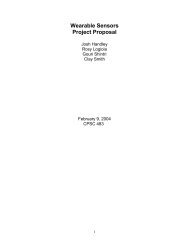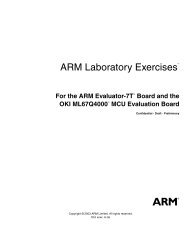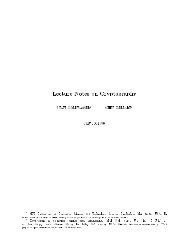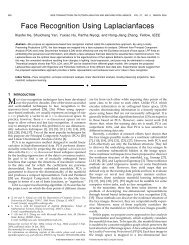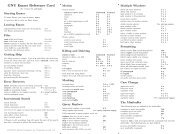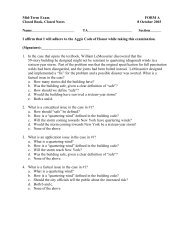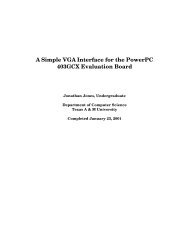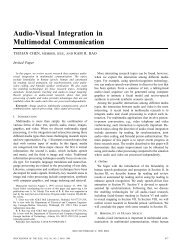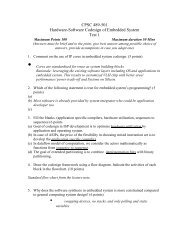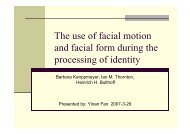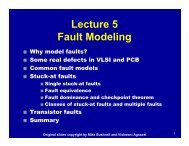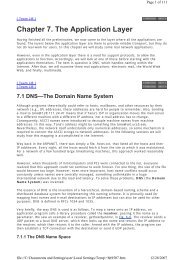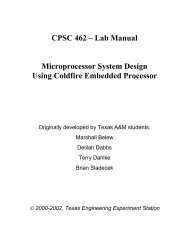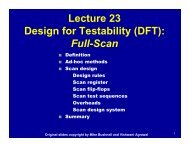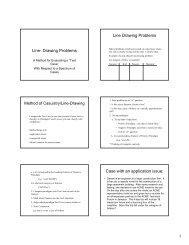Teresa Leyk, Ph.D. - CS Course Webpages - Texas A&M University
Teresa Leyk, Ph.D. - CS Course Webpages - Texas A&M University
Teresa Leyk, Ph.D. - CS Course Webpages - Texas A&M University
Create successful ePaper yourself
Turn your PDF publications into a flip-book with our unique Google optimized e-Paper software.
<strong>Teresa</strong> <strong>Leyk</strong>, <strong>Ph</strong>.D.<br />
Senior Lecturer<br />
Department of Computer Science &<br />
Engineering (<strong>CS</strong>E)<br />
901E Richardson Bldg.<br />
<strong>Texas</strong> A&M <strong>University</strong><br />
College Station, TX 77843-3112<br />
Office phone: 979-845-4456<br />
Email: teresa@cse.tamu.edu<br />
URL: courses.cse.tamu.edu/teresa/<br />
Education<br />
• <strong>Ph</strong>D in Mathematics, Australian National <strong>University</strong>, Canberra, Australia 1998<br />
• MS in Computer Science, <strong>University</strong> of Warsaw, Department of Mathematics,<br />
Computer Science & Mechanics, Warsaw, Poland 1979<br />
Professional Qualifications<br />
• Senior Lecturer at <strong>CS</strong>E Department, <strong>Texas</strong> A&M <strong>University</strong>,<br />
College Station, TX<br />
2003–present<br />
Taught courses on: programming in C++; data structures and algorithms using C, C++<br />
and Java; scientific computing.<br />
Supervised the Peer Teacher program to help increase <strong>CS</strong>E students retention sponsored by<br />
<strong>Texas</strong> Higher Education Coordinating Board <strong>Texas</strong> Technology Workforce Development<br />
grant (2007–2008) and Computer Science Department (2008–present).<br />
• Lecturer at <strong>CS</strong>E Department, <strong>Texas</strong> A&M <strong>University</strong>,<br />
College Station, TX 1997–2003<br />
Taught courses on: data structures and algorithms using C and Java; scientific computing.<br />
• Research Assistant, Australian National <strong>University</strong>, Canberra, Australia 1993–1997<br />
Did research and course work in mathematical modeling and simulation on parallel computers.<br />
Wrote routines for the numerical library called Meschach (distributed as a freeware package).<br />
Designed and coded in C a package of numerical routines for solving stiff ordinary differential<br />
equations.<br />
• Certified Teacher of Mathematics, Warsaw, Poland 1981–1989<br />
Taught mathematics and introduction into computer programming.<br />
Industry Work Experience<br />
• Programmer in BUMAR Research Institute, Warsaw, Poland 1979–1983<br />
Duties: developing, maintaining and implementing numerical software (primarily numerical<br />
packages in Fortran for solving ordinary differential equations).<br />
1
Grants & Awards<br />
• Selected to the final phase of the Fall 2009 Student Led Award for Teaching Excellence<br />
• Undergraduate Faculty Teaching Excellence Award, 2007<br />
• <strong>Ph</strong>D scholarship, Australian National <strong>University</strong>, 1994–1996<br />
Publications<br />
• “Solving linear and weakly nonlinear parabolic differential equations by Krylov approximation<br />
method”, with D. Stewart, in Proceedings of CTAC93, ANU, Canberra, 1993, H. Gardner,<br />
D. Singleton, and D. Stewart, eds., Singapore, 1994, World Scientific, pp. 329–337.<br />
• “Error estimates for Krylov approximations of matrix exponentials”, with D. Stewart, J. Comput.<br />
Appl. Math. 72 (1995), pp. 359–369.<br />
• “Numerical solving of a free boundary phase field model using Krylov subspace method”, with<br />
S. Roberts, in Proceedings of CTAC95, Melbourne, 1995, R. May and A. Easton, eds., Singapore,<br />
1996, World Scientific, pp. 479–487.<br />
Professional Membership and Services<br />
• Member, <strong>CS</strong>E ABET Committee, responsible for Former Student Survey (2002–present)<br />
• Member, <strong>CS</strong>E Undergraduate Curriculum Committee (2003–present)<br />
• Member of <strong>CS</strong>E Undergraduate Curriculum: working on remodeling and updating undergraduate<br />
courses (2005–2006).<br />
• Member of Undergraduate Recruiting Committee:<br />
(2005–2006).<br />
responsible for Freshman Orientation<br />
• Member of ACM and ASEE.<br />
<strong>Course</strong>s Approved to Teach<br />
• CPSC 210: “Data Structures”<br />
Methods for organizing data; design of algorithms for efficient implementation and manipulation<br />
of data structures<br />
• CPSC 211: “Data Structures and Their Implementations”<br />
Specification and implementation of basic data structures and abstract data types—linked<br />
lists, stacks, queues, trees and tables; performance tradeoffs of different implementations;<br />
asymptotic analysis of running time and memory usage; compares and contrast objectoriented<br />
language (typically, Java) and non-object-oriented languages (typically, C); emphasis<br />
on adherence to good software engineering principles.<br />
• CPSC 311: “Analysis of Algorithms”<br />
Design of computer algorithms for numeric and non-numeric problems; relation of data structures<br />
to algorithms; analysis of time and space requirements of algorithms; complexity and<br />
correctness of algorithms.<br />
• CPSC 442: “Scientific Programming”<br />
Introduction to numerical algorithms fundamental to scientific and engineering applications of<br />
computers; elementary discussion of error; algorithms, efficiency; polynomial approximations,<br />
quadrature and systems of algebraic and differential equations.<br />
2
• <strong>CS</strong>CE 206: “Structured Programming in C”<br />
Basic concepts, nomenclature and historical perspective of computers and computing; internal<br />
representation of data; software design principles and practice; structured and object-oriented<br />
programming in C; use of terminals, operation of editors and executions of student-written<br />
programs.<br />
• <strong>CS</strong>CE 113: “Intermediate Programming and Design”<br />
Continuation of ENGR 112; programming and design with C++; topics include design and<br />
implementation of functions, classes, and class hierarchies; software development strategies;<br />
error handling and exceptions; testing and debugging; type safety; strings; templates and the<br />
STL; graphics and GUIs; mathematical computation; and principles of object-oriented programming.<br />
Prerequisites: Knowledge of C++ programming, class design, portable graphics,<br />
and parameterized types and their implementations.<br />
• <strong>CS</strong>CE 221: “Data Structures and Algorithms”<br />
Specification and implementation of basic abstract data types and their associated algorithms:<br />
stacks, queues, lists, sorting and selection, searching, graphs, and hashing; performance tradeoffs<br />
of different implementations and asymptotic analysis of running time and memory usage;<br />
includes the execution of student programs written in C++.<br />
• ENGR 112: “Foundations of Engineering II ”<br />
Continuation of ENGR 111. Topics include, depending on the major: emphasis on computer<br />
applications and programming and solids modeling using CAD tools or other software;<br />
fundamentals of engineering science; advanced graphic skills.<br />
3



